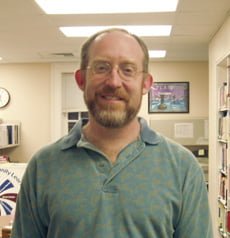Scott Pierce Coleman first heard his vitae voca, or life’s calling, while driving a lawn-mower. Coleman had just graduated from Amherst College and didn’t know what he wanted to do with his life. He had taken a summer job mowing his alma mater’s lawns. “I could point out the bush I was mowing around,” Coleman said. “It’s still there. And, all of a sudden, it hit me like a ton of bricks.”
In that moment, Coleman realized that his life’s calling would be helping other people listen for their own call.
Guilford has given Coleman a new opportunity to help others. On Nov. 5, Vice President Adrienne Israel announced that Coleman will serve as the new director of the college’s Initiative on Faith & Practice.
“The essential mission (of the Initiative) is to enrich Guilford’s premises: to help prepare people for a life’s work,” Coleman said in an interview.
He defines “a life’s work” as a person’s vocation. The word “vocation” is often misinterpreted as synonymous to a job; Coleman said the true meaning is the “merging of one’s gifts and passions in faithful service to God, humanity and the earth.”
Former Director Sarah Beth Terrell ’77 will take over as coordinator of faculty and staff retreats for the Initiative. Her voluntary resignation ended her three-year appointment as director.
“I think there’s definitely room to do it better. I think Scott brings gifts I didn’t have,” she said. “Administration is not my (strong) suit. I am much more gifted at working with small groups.”
In 2001, the Lilly Endowment Inc., a private foundation, subsidized the creation of the Initiative on Faith and Practice. The Lilly Endowment granted Guilford $2 million, the largest foundation grant in the college’s history, to establish the program.
“We hope that young people, whatever their profession turns out to be, will have plentiful opportunities (thanks to the grant) to think deeply about what they want to do with their lives and how their faith can enlighten and shape their choices,” Craig Dykstra, Vice President for Religion at the Lilly Endowment, said at the time.
As the Initiative’s first director, Terrell sought to encourage student thinking about the nature of vocations. “Helping students find their direction in life … is just simply part of what higher education should be doing,” she said.
Coleman plans to continue using the Initiative to help students find direction. He currently oversees the Service, Experi-ence, Reflection, Vocation, and Education (S.E.R.V.E.) workshop, a faculty training program designed to teach professors how to orient their students towards their post-graduate lives. The Initiative staff also works closely with the Career and Community Center to help guide undergraduates towards their lives’ callings.
Coleman, who also serves as Director of the Initiative’s Quaker Leadership Scholars Program (QSLP), is looking forward to the opportunities for reaching out to students that come with his new appointment.
“Being the Director doesn’t mean much to me. What is important is growing into an identity that will open doors into trust and respect,” he commented. “I feel like authority and respect are earned.”
Coleman described the frustrations many students en-counter when trying to discover their purpose in life. He compared choosing between pursuing career or calling to deciding whether to pursue happiness or joy.
“Pursuing a calling is about em-bracing joy at the expense of happiness,” Coleman said.
He ex-plained that the pursuit of happiness focuses on instant gratification, whereas the pursuit of joy requires sacrificing happiness in the short-term. Ultimately, however, the pursuit of joy will reward those willing to wait.
Choosing to follow one’s calling over a profitable career might require material sacrifices, but the ultimate pay-off is as great as the difference between being joyful and being happy, according to Coleman.
While he admitted that some students may not be ready to make the sacrifices requisite to finding their vocation, Coleman believes the Initiative can help those people.
“I think it’s good for students to be asking themselves ‘How serious am I about following my calling?'” he said, explaining that discovering one’s vocation is a life-long task without any clear ending.
Changing careers is not uncommon. Changing vocations, once you have heard the call, is impossible. Though he has been promoted, Coleman is still very much working for the same boss.

